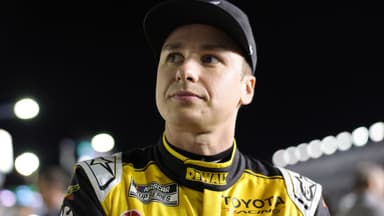NASCAR is big on tradition, always has been. Once the sport gets stuck on something, change is rare. That’s why NASCAR will not change the date of the season-opening Daytona 500. But it is eyeing potential changes in the timeline for some races.
Advertisement
The granddaddy of all Cup races, the Great American Race has been a part of NASCAR since Daytona International Speedway (DIS) opened in 1959. However, the 500 did not become the first race of the Cup season until 1982.
Even so, that’s a 43-year tradition as the season opener. And it’s going to stay that way.
“We would like to continue to see it as our opener,” NASCAR Executive Vice President Ben Kennedy said recently. “(In addition) I think we’ll continue to have the Clash prior to the 500.
“It’s a great opportunity for us to build up some momentum in anticipation for our biggest event of the year, the Daytona 500, and the new season ahead. We’ll continue to keep it in that spot.”
After a number of years as an appetizer for the Daytona 500, NASCAR moved the preseason Busch Clash for three years (2022-2024) to the Los Angeles Coliseum before moving to Bowman Gray Stadium in North Carolina for this year.
NASCAR made the decision not to move the 500 from its top spot on the schedule primarily because when asked, NASCAR fans spoke out in force.
“We ran a survey a couple years ago, and it was over 95 percent of our fan base wants to see their first points race be the Daytona 500,” Kennedy said. “That was a statistic that was strong enough for us to say we’re not even going to explore that for now.
“We’ll continue to have that exhibition race prior to it and plan to have Daytona 500 as a first points race.”
However, DIS has been ruled out of hosting the season-ending and championship-determining Cup race. In other words, forget about ending the season at the 2.5-mile, high-speed tri-oval.
Other than that, though, all bets are off.
Potential season-ending venues are limited
Right now, the only thing that is assured is the NASCAR Championship Weekend will return to the 1.5-mile Homestead-Miami Speedway in 2026 (Nov. 6-8), which previously was the season-ending venue from 2002 through 2019.
Phoenix Raceway has hosted the season finale for all three NASCAR Series – Cup, Xfinity and Trucks – from 2020 through the end of the current season.
After the 2026 season-ending race, NASCAR is eyeing somewhat of a round-robin type setup where the finale will be split between a number of tracks every year. Among the likely locations: Homestead-Miami, Phoenix, Texas, Charlotte Motor Speedway (but not the Roval race) and Las Vegas.
In other words, short and mid-length tracks but not on an unpredictable superspeedway.
Also out of reckoning are road courses like Sonoma, Watkins Glen, Circuit of the Americas, Mexico City, Charlotte Roval or a street course like Chicago.
“Never say never, but I think we’ve unanimously agreed that (the title race) needs to look and feel like what we would expect traditional NASCAR racing to look and feel like,” Kennedy said. “So short tracks, intermediate tracks, mile tracks are all on the board. Superspeedways, I think, we all feel right now we wouldn’t consider that as a championship venue, not that Daytona isn’t a championship-caliber venue.
“We want to make sure that when we go to Homestead-Miami or Phoenix or wherever it might be in the future, that there is a lot of strategy and that a lot of our championship drivers are also contending for the victory at the end of that race.”
Las Vegas could potentially be quite attractive, especially given that it serves as the centerpiece of the annual Specialty Equipment Market Association (SEMA) Show, the largest convention of aftermarket and third-party equipment manufacturers for the automotive and racing industry.
Weather is a big limiting factor
The weather would also likely eliminate several other potential venues which are great tracks, but there’s no guarantee a season-ending weekend wouldn’t be interrupted by rain or even snow. That would include locations such as St. Louis, Iowa, Richmond, Dover, Pocono, Kansas, Indianapolis, Martinsville (too small), Bristol (has had snow), Michigan, Nashville and New Hampshire.
“As you think about a championship race, ideally a warm weather kind of climate location,” Kennedy said. “You can’t race everywhere in the world, especially in early November, so there’s a handful of venues and properties that we tend to gravitate towards.”
While Darlington Raceway could be a possible choice to host the season finale, it’s unlikely NASCAR would have two races in the 10-race playoffs at the same location, as Darlington hosts the Southern 500 on Labor Day Weekend.
One aspect Kennedy likes is that moving things around would allow NASCAR to build more of a Super Bowl-esque atmosphere and have cities bid for the right to host the championship races.
Lastly, speaking of the Super Bowl, the NFL will likely push back its premier showcase one week, which could conflict with the Daytona 500. That may force NASCAR to delay the start to its season — one week later than it usually does on the second or third Sunday of February. But that remains to be seen.








